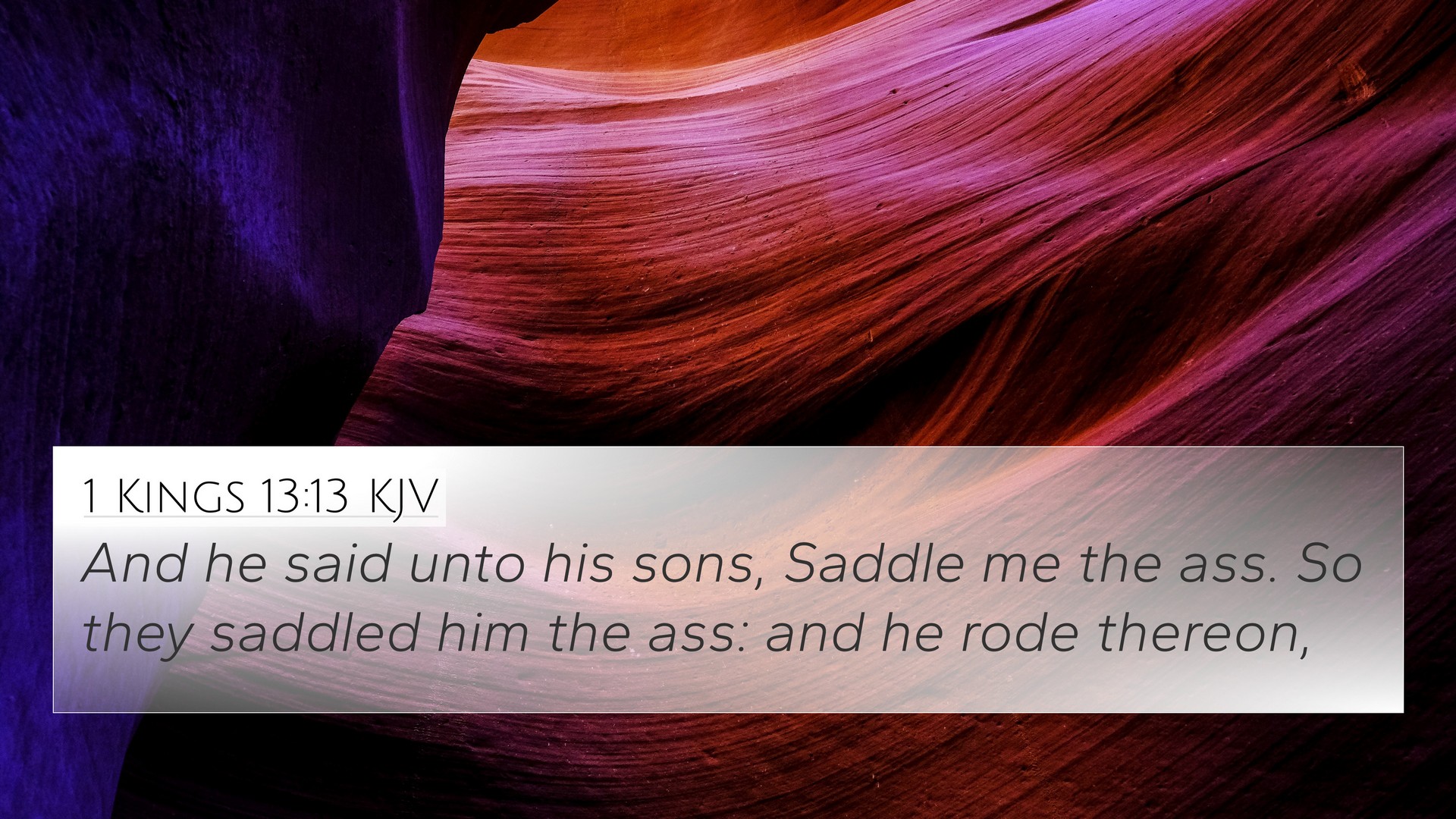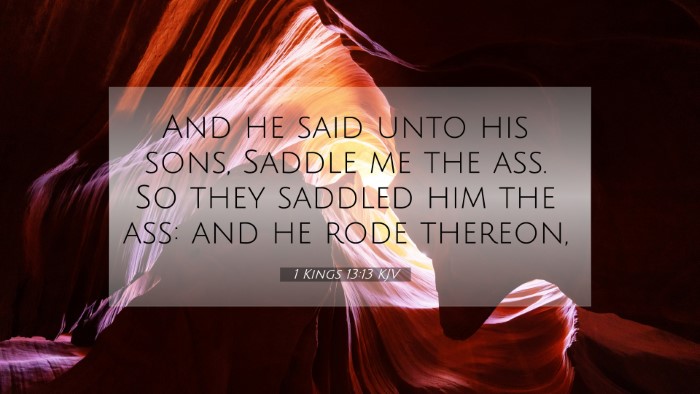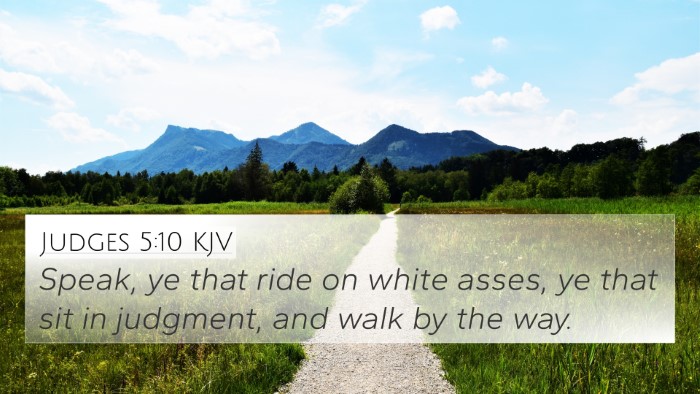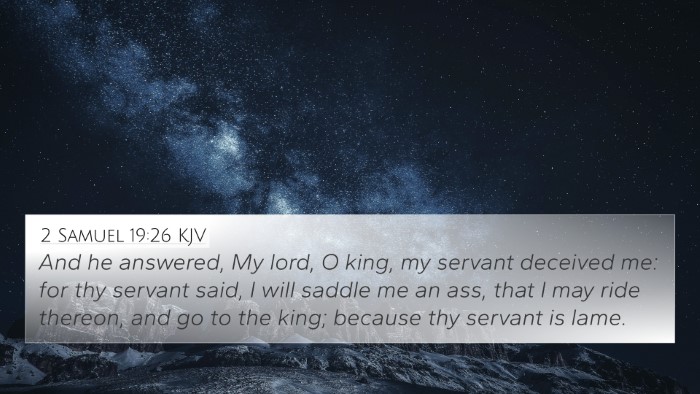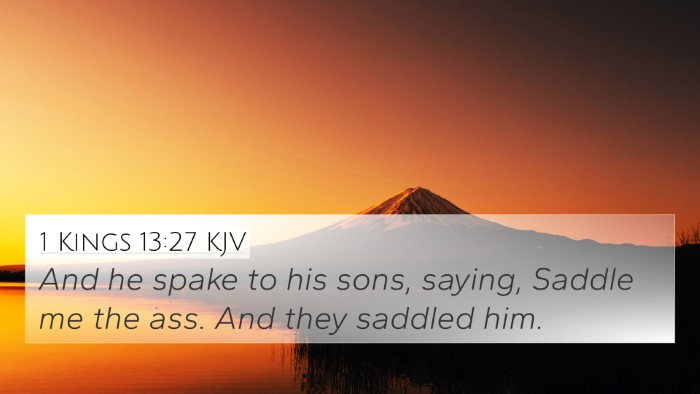Understanding 1 Kings 13:13
The verse 1 Kings 13:13 reads:
"And he said unto his sons, Saddle me the ass. So they saddled him the ass: and he rode thereon."
This verse occurs within the larger narrative of a prophet from Judah who is given a command from God. It reflects significant theological themes and moral lessons within the Biblical text.
Verse Context
To fully grasp the meaning of 1 Kings 13:13, it is essential to consider its surrounding text. The entire chapter deals with the actions of a prophet who disobeys God's command and the subsequent consequences of that disobedience.
Summarized Commentary Insights
- Matthew Henry: Henry emphasizes the seriousness of divine commands and warns against the temptation to stray from God's intentions. He reflects on the importance of obedience, suggesting that the prophet's journey serves as a reminder for all believers.
- Albert Barnes: Barnes notes the urgency in the prophet's actions. He sees the saddling of the ass as a symbol of readiness to follow God's command swiftly, which was later jeopardized by disobedience. He insists on the necessity of being aware of divine directives to avoid spiritual pitfalls.
- Adam Clarke: Clarke highlights the significance of the family aspect by referring to the sons, indicating that the actions of a leader often influence those around them. He sees this as an opportunity for the prophet's sons to learn obedience or disobedience towards God.
Thematic Analysis
This verse serves as a bridge to various themes found throughout the Bible:
- Obedience and Disobedience: The prophet's initial obedience leads to a critical lesson about the consequences of deviating from God’s commands.
- The Role of Family in Faith: By introducing his sons into the narrative, the passage underscores the influence of parental decisions on future generations.
- Divine Direction: The act of saddling the ass represents a readiness to act upon divine guidance, which carries significant importance in biblical narratives.
Cross-Referencing and Connections
1 Kings 13:13 can be cross-referenced with various other scriptures that amplify its themes:
- Deuteronomy 13:1-3: Caution against false prophets, echoing the necessity of discernment in following divine commands.
- Jeremiah 23:21-22: Provides insight into the consequences of prophetic disobedience.
- James 1:22: Encourages believers to be doers of the word, paralleling the need for action upon divine instruction.
- Matthew 7:21: The necessity of doing the will of the Father as a fundamental theme relevant to our passage's implications.
- Proverbs 3:5-6: Highlights the importance of trusting in the Lord's guidance.
- Luke 9:62: Jesus' emphasis on commitment in following Him connects with the urgency noted in the prophet’s actions.
- Hebrews 5:8: Discusses the importance of obedience as a form of learning and spiritual maturity.
Conclusion
In conclusion, 1 Kings 13:13 encapsulates vital lessons on obedience and the impact of choices made by prophets and leaders on those around them. The theological implications extend throughout the biblical narrative, reinforcing the significance of adhering to God's directives.
Further Study and Resources
For those looking to delve deeper into cross-referencing biblical texts, consider the following tools:
- Bible Concordance for finding related words and verses.
- Bible Cross-Reference Guide to explore thematic connections.
- Cross-Referencing Bible Study Resources for structured learning.
- Bible Reference Resources to facilitate deeper Bible study.
- Comprehensive Bible Cross-Reference Materials for an extensive look at inter-Biblical dialogues.
Understanding Bible verses, such as 1 Kings 13:13, becomes more enriching through recognizing their connections with one another, fostering a complete view of God's word.
